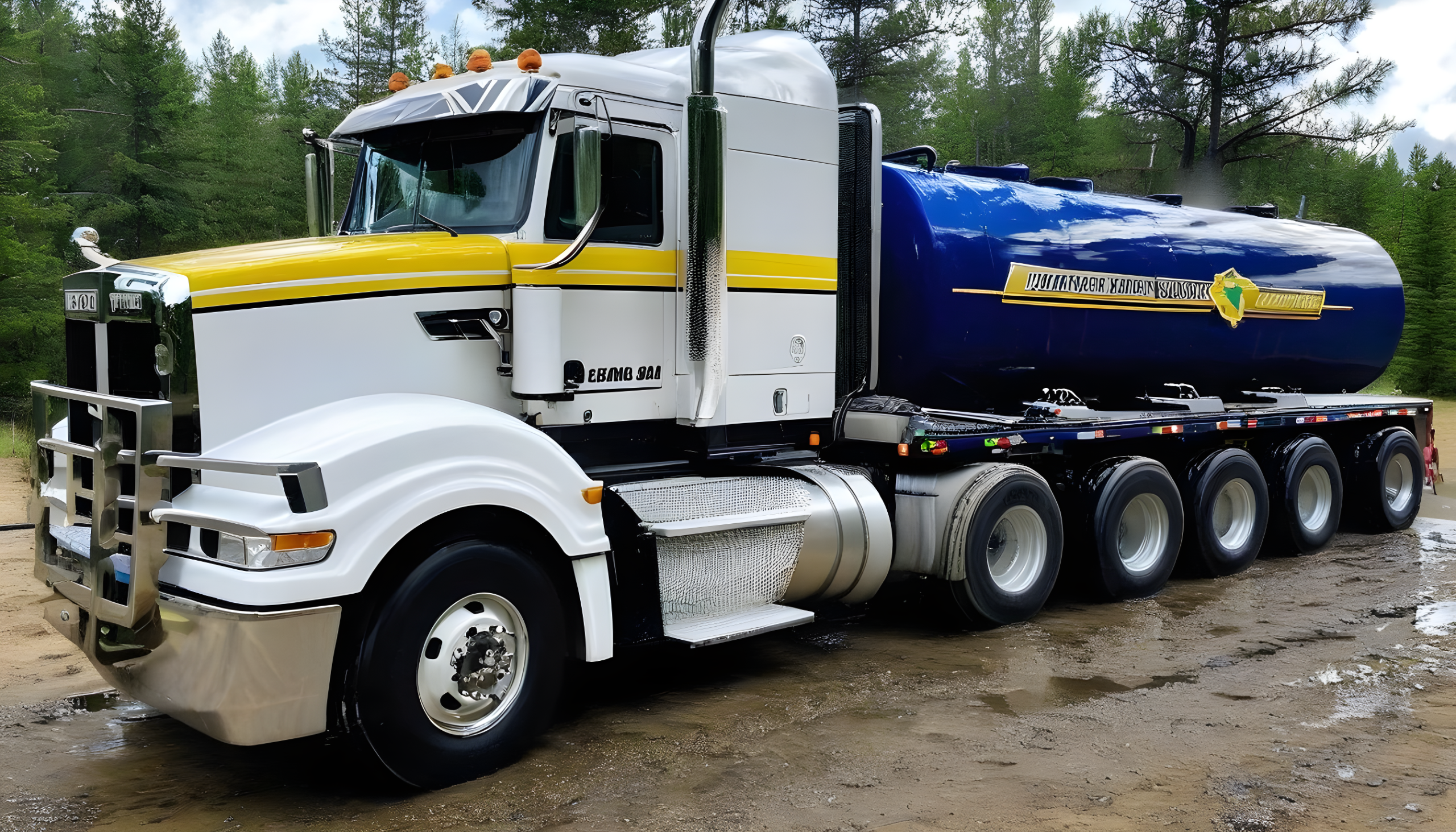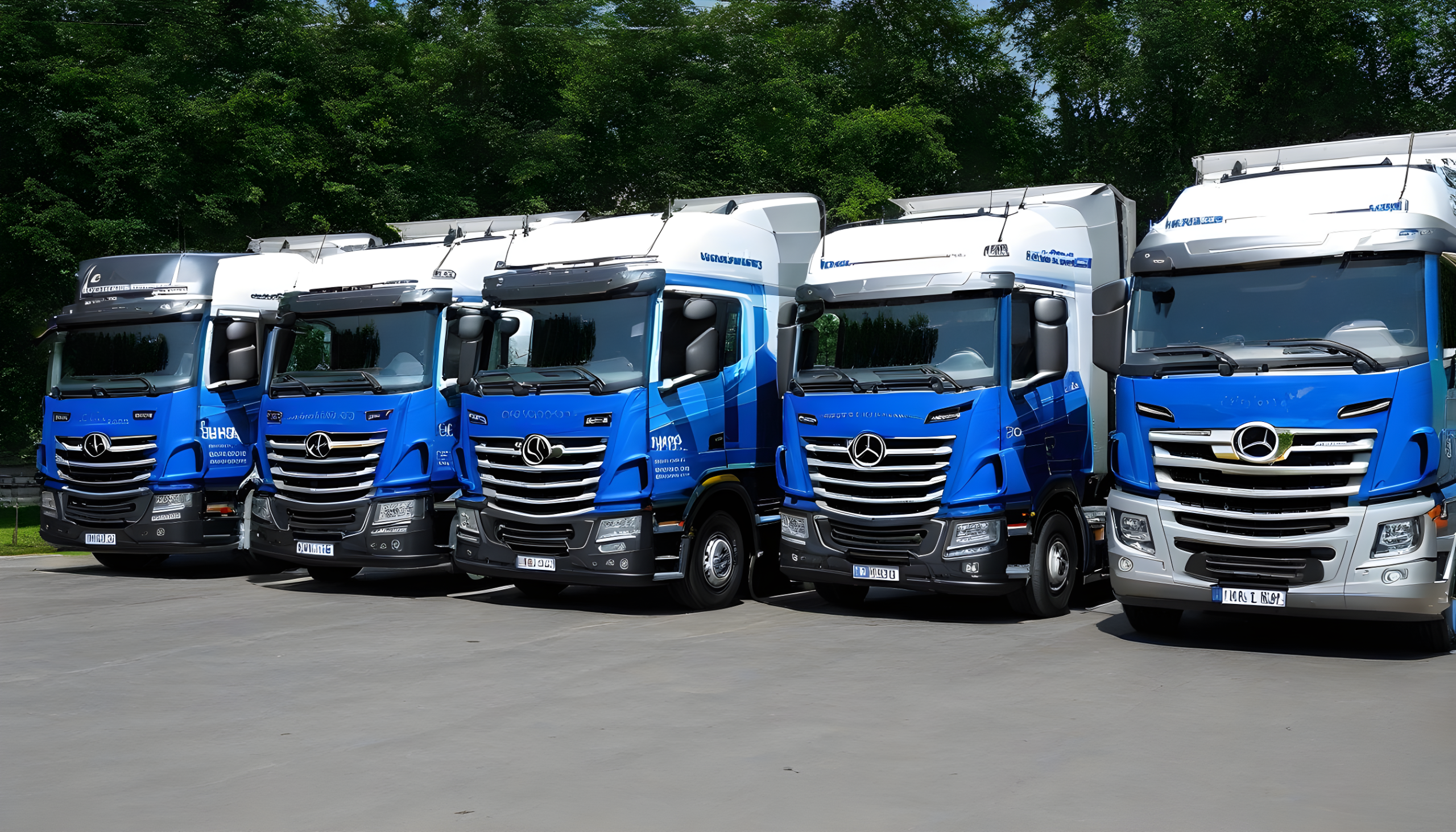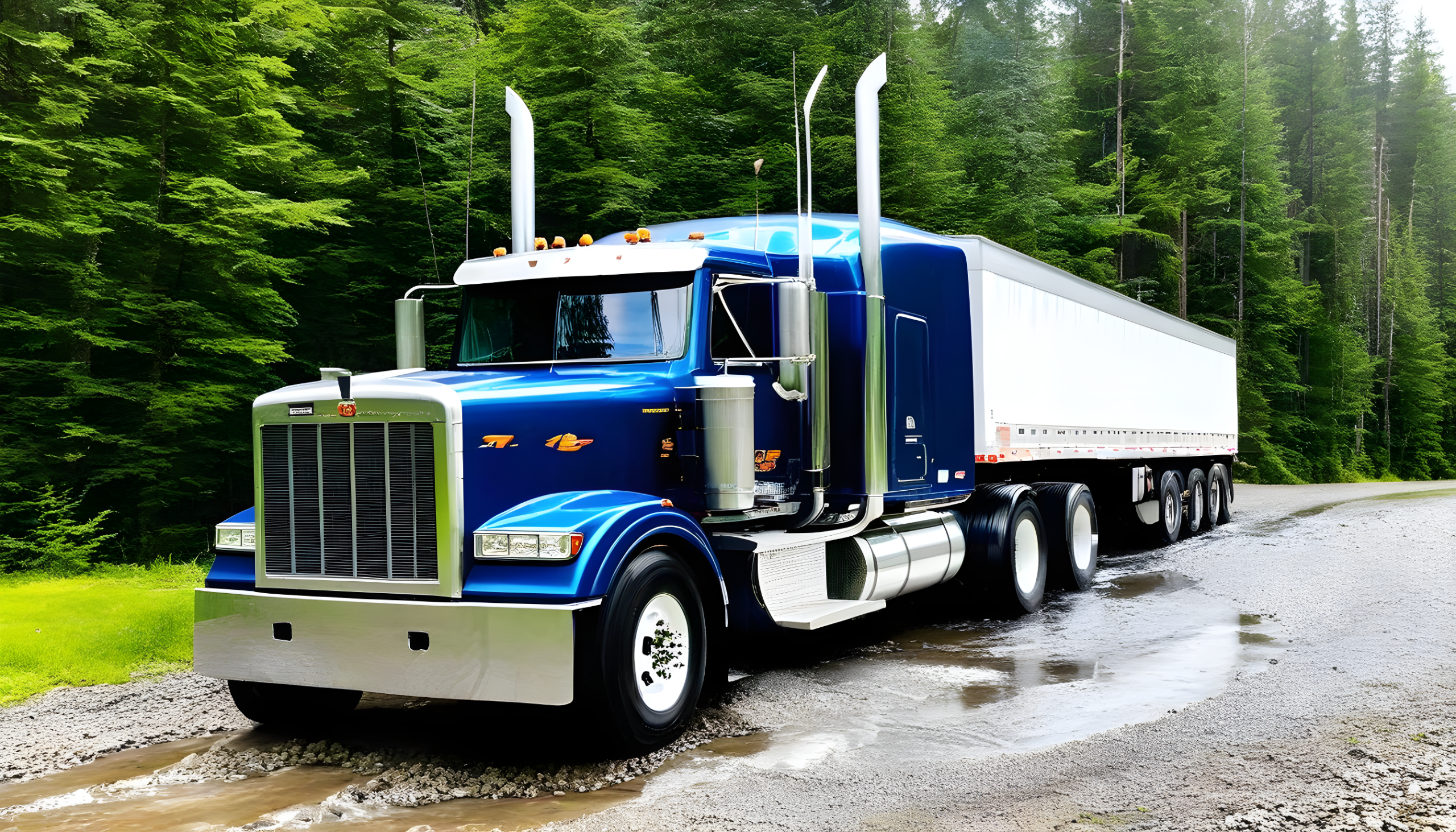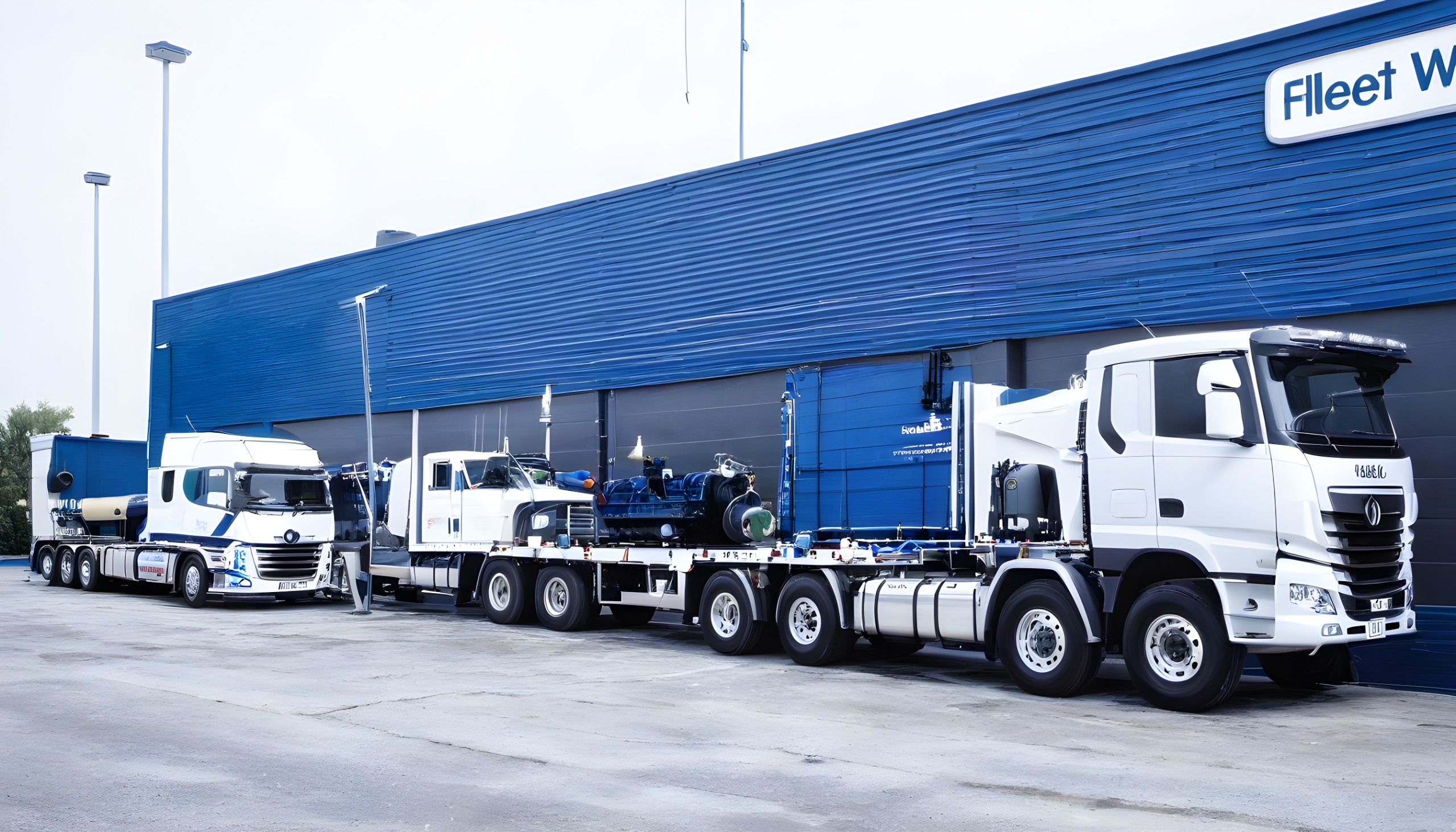Are you making these common tractor trailer fleet washing mistakes? Keeping your fleet of 18-wheelers clean and well-maintained is crucial for the success and longevity of your business. However, many trucking companies unknowingly fall into the trap of neglecting proper fleet washing practices. From ignoring undercarriage cleaning to using the wrong chemicals, these mistakes can lead to costly repairs and even legal issues. In this blog post, we will explore some of the most common tractor trailer fleet washing mistakes and provide valuable insights on how to avoid them. So, buckle up and let’s dive into the world of pristine trucks!
The problem with not having a fleet wash policy
Picture this: you have a fleet of tractor trailers that are constantly on the road, transporting goods from one place to another. These hardworking vehicles face all sorts of elements and road conditions on a daily basis. Without a proper fleet wash policy in place, you’re essentially leaving their cleanliness and maintenance up to chance.
The problem with not having a fleet wash policy is that it leads to inconsistency. Each driver may have their own idea of when, where, and how often to wash the trucks. Some may prioritize washing after long hauls, while others might let weeks or even months go by without giving the trucks a thorough cleaning.
This lack of consistency can result in an accumulation of dirt, grime, and road film on the exterior surfaces. Not only does this make your trucks look unsightly, but it can also cause damage over time if left unaddressed.
Furthermore, without a clear policy in place for fleet washing, there is no accountability or responsibility assigned to anyone specific. This means that important tasks like undercarriage cleaning or using appropriate chemicals may be overlooked or neglected entirely.
Having a fleet wash policy ensures that everyone involved understands their responsibilities when it comes to maintaining clean and well-maintained trucks. It establishes guidelines for regular washing schedules as well as proper techniques and products to use during the process.
Investing time in creating a comprehensive fleet wash policy will save you headaches down the line. By setting clear expectations for cleanliness standards and providing necessary training for your drivers or designated personnel who handle the washing tasks, you can ensure that your tractor trailers remain in top-notch condition throughout their lifespan – promoting safety on the roads while projecting professionalism for your business.
Fleet washing in severe temperatures
Fleet washing in severe temperatures can present some unique challenges. Whether it’s scorching hot or freezing cold, extreme weather conditions can make the task of keeping your tractor trailer fleet clean even more difficult. However, neglecting to wash your fleet during these times can have serious consequences for both the appearance and performance of your vehicles.
In hot temperatures, dirt and grime can bake onto the surface of the trucks, making it harder to remove. Additionally, high temperatures can cause water to evaporate quickly, making it necessary to use more water or a higher-pressure washer to effectively clean the vehicles. On the other hand, washing in freezing temperatures requires special precautions to prevent equipment from freezing and causing damage.
Despite these challenges, regular fleet washing is still crucial during severe temperatures. Not only does it help maintain a professional image for your company by presenting clean and well-maintained trucks on the road but also prevents corrosive substances like road salt from damaging paint and metal surfaces.
To combat these issues, consider using specialized cleaning products designed for extreme temperature conditions. These products are formulated specifically to provide effective cleaning power while being safe for use in any weather condition.
By implementing a comprehensive fleet wash policy that includes guidelines for washing during severe temperatures, you can ensure that your vehicles remain spotless no matter what Mother Nature throws at them!
Residual wash water and the clean water act
Residual Wash water or wastewater is a common byproduct of fleet washing, and it’s important to understand the regulations surrounding its disposal. One key regulation that applies is the Clean Water Act. This federal law was enacted to protect our nation’s waterways from pollution.
Under the Clean Water Act, it is illegal to discharge pollutants into waters of the United States without a permit. This includes wastewater generated during fleet washing operations. The act requires businesses to properly treat their wastewater before releasing it into the environment.
Failing to comply with these regulations can have serious consequences for your business. Violations of the Clean Water Act can result in hefty fines and legal penalties. Furthermore, improper disposal of wastewater can harm aquatic ecosystems and contaminate drinking water sources.
To ensure compliance with the Clean Water Act, it’s crucial for fleet owners and operators to implement proper wastewater management practices. This may involve investing in filtration systems or partnering with professional wash facilities that adhere to environmental guidelines.
By responsibly managing wastewater, you not only avoid legal troubles but also contribute towards preserving our precious water resources for future generations. So remember, when it comes to fleet washing, always prioritize environmental stewardship!

Removal of road grime
One common mistake in fleet washing is neglecting the removal of road film or road grime from tractor trailers. Road film refers to the layer of dirt, grime, and pollutants that accumulate on the surface of a vehicle while it’s on the road. This build-up not only makes your fleet look dirty and unprofessional but can also cause damage over time.
Road film consists of various substances like oil, grease, exhaust fumes, and dust particles that can adhere to the truck’s exterior. If left untreated, these contaminants can corrode the paintwork and metal surfaces, leading to costly repairs.
Regularly removing road film should be an essential part of your fleet wash policy. Using appropriate cleaning techniques such as high-quality brushes and effective detergents will help break down and remove stubborn road film without damaging the truck’s finish.
Additionally, investing in undercarriage cleaning is crucial for thorough maintenance. The undercarriage is especially prone to collecting road debris, salt residue (particularly during winter months), and other harmful substances that can accelerate corrosion if not properly cleaned.
By incorporating proper cleaning methods into your fleet washing routine – including addressing road film effectively – you’ll maintain a clean appearance for your trucks while safeguarding their longevity.
Not washing the fleet in winter
Winter weather can be brutal, with snow, ice, and freezing temperatures making it challenging to keep your tractor trailer fleet clean. However, neglecting to wash your trucks during the winter months can lead to a host of problems that may impact their performance and longevity.
One common mistake is assuming that the cold weather will naturally clean the vehicles. While it’s true that rain or melting snow may rinse off some dirt, road salt and other corrosive materials can accumulate on the trucks’ surfaces. If left unattended for long periods, these substances can cause rusting and damage to the paintwork.
Another mistake is underestimating the importance of maintaining a clean undercarriage during winter. Road salt and chemicals used for de-icing can get trapped in hard-to-reach areas underneath the truck. Over time, this buildup can corrode vital components such as brake lines and suspension parts.
Using low-quality brushes or improper cleaning agents when washing your fleet in winter is another error you should avoid. Substandard equipment or harsh chemicals could potentially damage sensitive parts of your vehicles or leave behind streaks and residue.
Although it may require extra effort and precautions during colder months, regular fleet washing even in winter is crucial for preserving the integrity of your tractor trailers. By investing in proper techniques like using heated water or automatic wash systems designed for cold temperatures, you ensure that road film, grime, salt deposits are effectively removed from all surfaces.
Remember: taking care of your fleet throughout all seasons will help prolong its lifespan while also projecting a professional image to clients on icy roads!
Neglecting undercarriage cleaning
One common mistake in fleet washing is neglecting the undercarriage cleaning of tractor trailers. The undercarriage is often overlooked during the wash process, but it is an essential area that needs regular attention.
The undercarriage of a tractor trailer is prone to accumulating dirt, grime, and road salt. If left uncleaned, these contaminants can lead to corrosion and damage to critical components such as the suspension system or brake lines.
Cleaning the undercarriage requires specialized equipment and techniques. High-pressure washers with rotating nozzles are commonly used to effectively remove debris from hard-to-reach areas. Additionally, using appropriate chemicals can help break down stubborn grease and oil buildup.
Regularly cleaning the undercarriage not only extends the lifespan of your fleet vehicles but also ensures their safe operation on the road. Neglecting this important step in fleet washing can result in costly repairs and potential safety hazards for drivers and other motorists.
Including thorough undercarriage cleaning as part of your fleet washing routine is crucial for maintaining optimal performance and longevity of your tractor trailers. Don’t overlook this vital aspect when it comes to keeping your fleet clean!
Washing with the wrong chemicals
When it comes to fleet washing, using the right chemicals is crucial. Washing with the wrong chemicals can lead to a range of issues that can negatively impact not only the appearance but also the performance and longevity of your tractor trailer fleet.
Using harsh or abrasive chemicals can cause damage to the paintwork and other surfaces of your vehicles. This can result in costly repairs and diminish their overall value. On the other hand, using gentle and eco-friendly cleaning solutions ensures effective cleaning without causing any harm.
Additionally, using improper chemicals may not effectively remove road film – a combination of dirt, grime, exhaust fumes, and oil residue that accumulates on vehicles over time. Road film not only makes your fleet look dirty but also reduces visibility for drivers and affects aerodynamics.
Moreover, using incorrect chemicals can pose environmental risks as well. Chemical runoff from improperly washed trucks may contaminate local water sources and violate regulations set by the Clean Water Act.
To avoid these problems, it’s important to use industry-approved truck wash detergents specifically designed for removing road film while being safe for vehicle surfaces and environmentally friendly. It’s always recommended to consult with professionals or follow manufacturer guidelines when selecting appropriate cleaning agents for your fleet washing needs.
Remember: choosing the right chemical products will help maintain your tractor-trailer fleet’s appearance while ensuring maximum safety on the roads!

Why is water quality important in tractor trailer washing
Water quality plays a crucial role in tractor trailer washing. When it comes to keeping your fleet clean and maintaining its appearance, using high-quality water is essential. Here’s why:
Using good quality water ensures that the cleaning process is effective. Clean water helps to remove dirt, grime, and road film from the surface of the trailers more efficiently. It allows for a thorough wash without leaving behind streaks or residue.
Using clean water minimizes the risk of damage to the trailer’s paint job and other exterior components. Hard or contaminated water can contain minerals and impurities that can leave spots or etch into the paintwork over time. By using filtered or purified water, you can protect your fleet from potential corrosion or discoloration.
Clean water contributes to environmental sustainability. Using recycled or treated wastewater in compliance with regulations helps conserve freshwater resources while minimizing pollution risks associated with runoff containing harmful chemicals.
Maintaining good water quality promotes overall hygiene and cleanliness standards within your fleet washing operations. By preventing contamination from bacteria or pollutants present in low-quality water sources, you ensure a safe working environment for your employees.
By prioritizing high-quality water in tractor trailer washing procedures, you not only maintain an aesthetically pleasing fleet but also extend the lifespan of your equipment while reducing negative impacts on both human health and the environment.
Dont use too much pressure with a power washer
When it comes to fleet washing, using a power washer can be an effective tool for removing dirt and grime from tractor trailers. However, it’s important to remember that more pressure isn’t always better. Using too much pressure with a power washer can actually cause damage to the vehicle’s paint or even strip away decals or other graphics.
One of the main issues with excessive pressure is that it can force water and cleaning chemicals into areas where they shouldn’t go, such as electrical components or sensitive engine parts. This can lead to costly repairs and potential downtime for your fleet.
Another problem with using high pressure is that it may not necessarily result in a cleaner vehicle. In fact, too much pressure can often just push dirt around or create streaks on the surface of the trailer instead of effectively removing it.
Instead of cranking up the pressure on your power washer, consider adjusting the nozzle setting to a wider spray pattern. This will help distribute water evenly across the surface without applying excessive force.
Additionally, be mindful of how close you hold the wand to the vehicle while washing. Keeping a reasonable distance will prevent any accidental damage caused by high-pressure streams hitting delicate areas.
While power washers are valuable tools for fleet washing, exercising caution when it comes to pressure is essential in order to protect your vehicles and ensure optimal cleaning results.
Why automatic fleet washing may be superior to hand washing
When it comes to keeping your tractor trailer fleet clean and presentable, the method you choose for washing can make a big difference. While hand washing may seem like a cost-effective option, automatic fleet washing offers several advantages that make it a superior choice.
Automatic fleet washing saves time and manpower. With multiple trucks in your fleet, individually hand washing each one can be a labor-intensive task. Automatic systems streamline the process by utilizing brushes and high-pressure jets to efficiently clean every nook and cranny of the vehicles.
Additionally, automatic systems ensure consistent cleaning results. Hand washes may vary in quality depending on factors such as operator technique or fatigue levels. On the other hand, automated systems are designed to deliver uniform cleaning performance with each use.
Furthermore, automatic fleet washing often incorporates water recycling technologies. This not only helps reduce wastewater usage but also ensures compliance with environmental regulations such as the Clean Water Act.
Moreover, automated systems often come equipped with specialized detergents tailored specifically for truck washing needs. These chemicals effectively remove road film without causing damage to paint or surfaces.
Regular maintenance of an automated system is relatively straightforward compared to training personnel for hand wash routines.
Considering the efficiency, consistency in results, environmental benefits and ease of maintenance offered by automatic fleet washing systems over traditional handwashing methods makes them a superior choice for maintaining your 18-wheel tractor trailer fleet’s cleanliness and appearance.

Poor wash personnel training
One of the common mistakes that fleet owners make when it comes to tractor trailer washing is poor wash personnel training. Having a well-trained team of wash personnel is crucial for ensuring that your fleet receives a proper and thorough cleaning.
Without proper training, wash personnel may not be aware of the correct techniques and procedures for washing tractor trailers. They may use excessive pressure with power washers or scrub too vigorously with wash brushes, potentially causing damage to the exterior surfaces of the vehicles.
Additionally, inadequate training can result in inconsistencies in the cleaning process. Some areas of the trucks may be overlooked or not cleaned thoroughly, leading to a buildup of road film and grime over time.
Properly trained wash personnel are also aware of the importance of water quality when it comes to truck washing. They understand that using clean water is essential for achieving optimal results and preventing potential damage caused by contaminants in dirty water.
By investing in comprehensive training programs for your wash personnel, you can ensure that they have the knowledge and skills necessary to properly clean your fleet. This will help maintain the appearance and condition of your tractor trailers while prolonging their lifespan.
Remember, neglecting adequate training for your wash personnel can lead to subpar cleaning results and potential harm to your valuable assets. Stay proactive by prioritizing ongoing education and skill development within your team!
Regular fleet inspections
Regular fleet inspections are a crucial aspect of maintaining the cleanliness and condition of tractor trailers. These inspections ensure that any issues or problems with the fleet can be identified and addressed promptly, minimizing downtime and costly repairs.
During these inspections, trained personnel thoroughly examine each vehicle for signs of damage, such as dents, scratches, or leaks. They also check the undercarriage to ensure there is no buildup of dirt or debris that could potentially lead to corrosion or mechanical issues.
In addition to checking the physical condition of the trucks, regular inspections also include evaluating their overall cleanliness. This involves looking for any road film or grime that may have accumulated on the exterior surfaces. It’s important to address this buildup promptly as it can impair visibility and even affect fuel efficiency.
By conducting routine fleet inspections, companies can catch potential problems early on before they become major issues. This proactive approach helps ensure that all vehicles in the fleet are in optimal working condition, promoting safety on the road and reducing maintenance costs in the long run.
Regular fleet inspections play a vital role in keeping tractor trailers clean and well-maintained. By prioritizing these inspections as part of your fleet washing routine, you can enhance both the appearance and performance of your vehicles while increasing their longevity.
Conclusion
Maintaining a clean and well-maintained fleet is crucial for any trucking company. By avoiding common tractor trailer fleet washing mistakes, you can not only improve the appearance of your vehicles but also extend their lifespan and ensure they operate at peak performance.
Having a solid fleet wash policy in place is the first step towards keeping your trucks clean and presentable. This policy should outline regular cleaning schedules, including undercarriage washes to remove road film and prevent corrosion. It’s essential to train your wash personnel properly on the correct techniques and use of appropriate chemicals for truck washing.
Additionally, it’s important to consider water quality when washing your tractor trailers. Using high-quality water ensures that no contaminants or minerals are left behind, which could lead to damage over time. Always opt for gentle pressure when using a power washer to avoid causing unnecessary harm to surfaces.
While hand washing may seem like an effective method, automatic fleet washing systems offer numerous advantages. These systems are designed specifically for cleaning large vehicles efficiently while minimizing water usage and reducing labor costs.
Regular inspections of your fleet will help identify any issues early on before they become more significant problems. By addressing these concerns promptly, you can prevent costly repairs down the line.
Taking proactive steps towards proper tractor trailer fleet washing will not only enhance the image of your business but also save you money in the long run by prolonging the life of your vehicles. Don’t underestimate the impact that cleanliness can have on customer perception and employee morale!
So remember: establish a comprehensive fleet wash policy, be mindful of temperature extremes during cleaning processes, adhere to regulations set forth by the Clean Water Act regarding wastewater disposal, prioritize removing road film regularly from all surfaces (including undercarriages), select appropriate chemicals for truck washing according to specific needs/preferences/requirements; maintain suitable levels of cleanliness even during winter months when conditions might make it challenging; don’t neglect thorough undercarriage cleansing due its role in preventing corrosion and other damage; be mindful of water quality as it can



